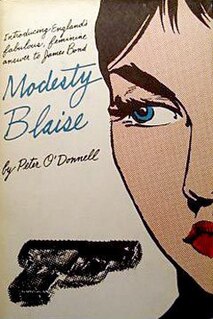Related Research Articles

Modesty, sometimes known as demureness, is a mode of dress and deportment which intends to avoid the encouraging of sexual attraction in others. The word "modesty" comes from the Latin word modestus which means "keeping within measure". Standards of modesty are culturally and context dependent and vary widely. In this use, it may be considered inappropriate or immodest to reveal certain parts of the body. In some societies, modesty may involve women covering their bodies completely and not talking to men who are not immediate family members; in others, a fairly revealing but one-piece bathing costume is considered modest while other women wear bikinis. In some countries, exposure of the body in breach of community standards of modesty is also considered to be public indecency, and public nudity is generally illegal in most of the world and regarded as indecent exposure. For example, Stephen Gough, a lone man attempting to walk naked from south to north in the United Kingdom, was repeatedly imprisoned. However, nudity is at times tolerated in some societies; for example by Digambara monks in India, who renounce clothing for ascetic reasons, and during a World Naked Bike Ride.

Modesty Blaise is a British comic strip featuring a fictional character of the same name, created by author Peter O'Donnell and illustrator Jim Holdaway in 1963. The strip follows Modesty Blaise, an exceptional young woman with many talents and a criminal past, and her trusty sidekick Willie Garvin. It was adapted into films in 1966, 1982, and 2003, and from 1965 onwards eleven novels and two short story collections were written.

Modesty Blaise is a 1966 British spy-fi comedy film directed by Joseph Losey, produced by Joseph Janni, and loosely based on the popular comic strip Modesty Blaise by Peter O'Donnell, who co-wrote the original story upon which Evan Jones and Harold Pinter based their screenplay. It stars Monica Vitti as "Modesty", opposite Terence Stamp as Willie Garvin and Dirk Bogarde as her nemesis Gabriel. The cast also includes Harry Andrews, Michael Craig, Alexander Knox, Rossella Falk, Clive Revill, and Tina Aumont. The film's music was composed by Johnny Dankworth and the theme song, Modesty, sung by pop duo David and Jonathan. It was Vitti's first English-speaking role.

Stephan von Breuning was an Austrian entomologist who specialised in the study of beetles (Coleopterology), particularly within the longhorn family (Cerambycidae).

Pogonocherini is a tribe of longhorn beetles of the subfamily Lamiinae.

Hybolasius is a genus of longhorn beetles of the subfamily Lamiinae, containing the following species:
Hybolasius femoralis is a species of beetle in the family Cerambycidae. It was described by Broun in 1893. It is known from New Zealand.
Hybolasius fasciatus is a species of beetle in the family Cerambycidae. It was described by Broun in 1881. It is known from New Zealand.
Hybolasius genalis is a species of beetle in the family Cerambycidae. It was described by Broun in 1903. It is known from New Zealand. It contains the varietas Hybolasius genalis var. tumidellus.
Hybolasius laticollis is a species of beetle in the family Cerambycidae. It was described by Broun in 1903. It is known from New Zealand.
Hybolasius modestus is a species of beetle in the family Cerambycidae. It was described by Broun in 1880. It is known from New Zealand.
Hybolasius parvus is a species of beetle in the family Cerambycidae. It was described by Broun in 1880. It is known from New Zealand. It contains the varietas Hybolasius parvus var. pusillus.
Hybolasius promissus is a species of beetle in the family Cerambycidae. It was described by Broun in 1880. It is known from New Zealand.
Hybolasius vegetus is a species of beetle in the family Cerambycidae. It was described by Broun in 1881. It is known from New Zealand.

Hybolasius crista is a species of beetle in the family Cerambycidae. It was described by Johan Christian Fabricius in 1775. It is known from New Zealand.
Hybolasius lanipes is a species of beetle in the family Cerambycidae. It was described by Sharp in 1877. It is known from New Zealand.
Hybolasius pumilus is a species of beetle in the family Cerambycidae. It was described by Francis Polkinghorne Pascoe in 1876. It is known from New Zealand.
Hybolasius sinuatofasciatus is a species of beetle in the family Cerambycidae. It was described by Stephan von Breuning in 1940. It is known from New Zealand.
Hybolasius trigonellaris is a species of beetle in the family Cerambycidae. It was described by Hutton in 1898. It is known from New Zealand.

Haya is an Arabic word that means "natural or inherent, shyness and a sense of modesty". In Islamic terminology, it is mainly used in the context of modesty. The word itself is derived from the word Hayat, which means "life". The original meaning of Haya refers to "a bad or uneasy feeling accompanied by embarrassment". Haya encourages Muslims to avoid anything considered to be distasteful or abominable. Haya plays an important role in Islam, as it is one of the most important parts of Iman. The antonym of Haya in Arabic is badha'a or fahisha.
References
- ↑ BioLib.cz - Hybolasius modestior. Retrieved on 8 September 2014.